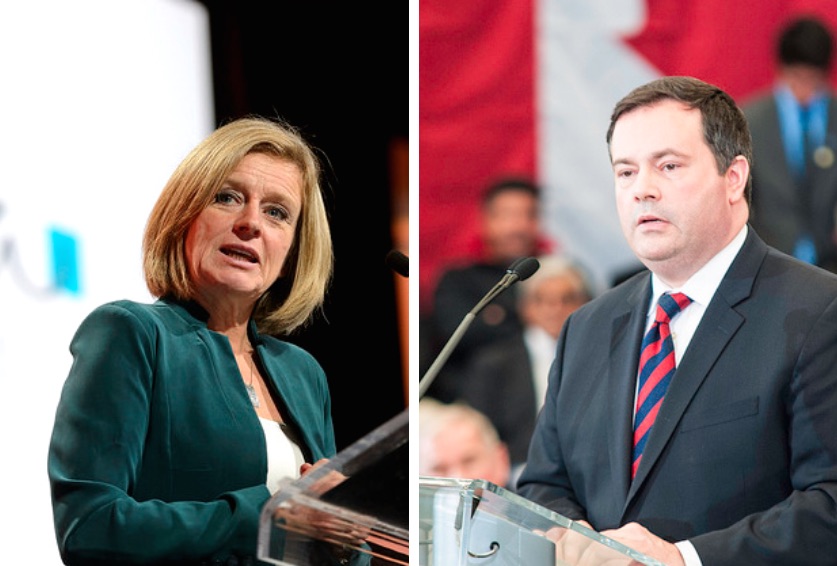It’s unusual to see Alberta Premier Rachel Notley and Opposition Leader Jason Kenney in agreement about an important policy direction — and a little weird too, given both of their past histories on some of the key issues involved.
I speak, of course, of last Thursday’s announcement by Premier Notley that her NDP government would help prop up the Keystone XL Pipeline by signing an agreement with TransCanada Corp. to ship 50,000 barrels of oil every day for 20 years down the still only partly complete line to the Texas Gulf.
As Kenney pointed out with partial accuracy in a snotty tweet the same day, this is a change from the less than enthusiastic positions taken in the past by the NDP on the megaproject when it was being delayed by former U.S. President Barack Obama and before it was revived last year by his successor Donald Trump.
But is it just me, or was Kenney also adopting a policy traditionally associated with parties like the NDP when he tweeted, “Glad to see that the Alberta Govt has finally come around to recognizing the importance of Keystone XL, after years opposing the project”?
After all, isn’t the position we’ve come to expect from market fundamentalist conservative ideologues like Kenney that governments ought never to interfere with the functioning of free markets with the intention of “picking winners and losers,” lest they pick a loser?
So do Kenney and his United Conservative Party now agree with the traditional NDP point of view of the proper role of governments in the market, or is he just doing favours for his friends in the oil industry regardless of what he claims to think?
And has Notley accepted the traditional Alberta conservative position on helping out the oil industry no matter what it wants, or is she merely demonstrating a penchant for picking losers by propping up a megaproject that wouldn’t get off the ground without some level of government encouragement?
Perhaps this incongruous mutual positioning explains why neither party has apparently seen fit to publish a formal document explaining their reasoning.
Well, at least Notley told reporters that the move — which she denied was a bailout, although the Keystone XL Pipeline was thought in some quarters to be on life-support — is intended to help TransCanada get the project off the ground by reviving commercial interest in it.
The premier also argued the pipeline will help Alberta get a better return on oil from the Athabacsa Bitumen Sands. As noted in this space in the recent past, that is not a universally accepted point of view, even if it is shared by both government and opposition leaders.
According to a report published eight months ago by the Edmonton-based Parkland Institute, many assumptions on which longstanding pro-pipeline arguments are based are questionable or no longer valid. Building additional pipelines “will not mean a higher price for oil,” argued earth scientist David Hughes in the report.
Still, it is true that with the Alberta government’s credit rating, there’s a case to be made it would be foolish not to sign a long-term shipping agreement somewhere, and the only one available after the collapse of the Enbridge Energy East Pipeline was on Keystone XL.
Be that as it may, pipeline opponents continue to make the case Keystone XL is not viable.
“Any project that needs a government bailout amid a quagmire of ongoing legal and regulatory challenges has little chance of moving forward,” senior analyst Adam Scott of the clean energy advocacy group Oil Change International said the same day Notley made the commitment.
“While TransCanada is out with bold statements that make it sound like the pipeline is now on the verge of construction, reality paints a much harsher picture for the project’s prospects,” agreed Josh Axelrod, an analyst for the Natural Resources Defense Council in a critique of TransCanada’s business prospects quoted by The Energy Mix.
President Trump may have brought Keystone XL back from the brink, Axelrod observed, but the regulatory obstacles in its way continue to grow. He asserted that last week’s announcements by the company (it has secured commitments to move 500,000 barrels a day) and Alberta (it will contribute 50,000 barrels from its Bitumen Royalties-In-Kind program through the Alberta Petroleum Marketing Commission to the flow) highlight “how hard it will be for the company to ever move forward.”
Indeed, as the Canadian Press reported, while TransCanada said the commitments it has received are enough to start getting ready to build the final phase of the line, the company “was not yet ready to made a final investment decision.”
Alberta’s previous Progressive Conservative government made a similar commitment to ship 100,000 barrels a day through Energy East to a Canadian refinery New Brunswick, a project that has since fallen by the wayside. But former PC energy minister Ken Hughes in November told the Financial Post he didn’t think extending the same support to TransCanada’s Keystone XL line made sense because it won’t replace foreign crude in Eastern Canadian refineries.
Even if TransCanada can overcome regulatory hurdles in the United States, it seems like the almighty market, so beloved by conservatives like Kenney, may turn out to be the biggest challenge to the viability of Keystone XL and other pipeline projects, with or without a visible hand from the Alberta government.
Interesting, though, that Kenney and Notley are singing from the same hymn sheet on this one, whether or not they’re singing in perfect harmony.
This post also appears on David Climenhaga’s blog, AlbertaPolitics.ca.
Photo: Premier of Alberta/flickr and michael_swan/flickr




